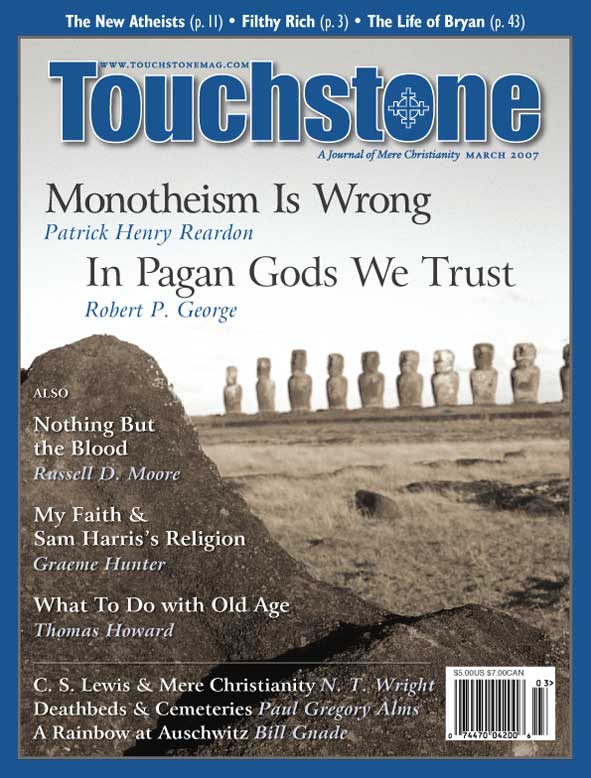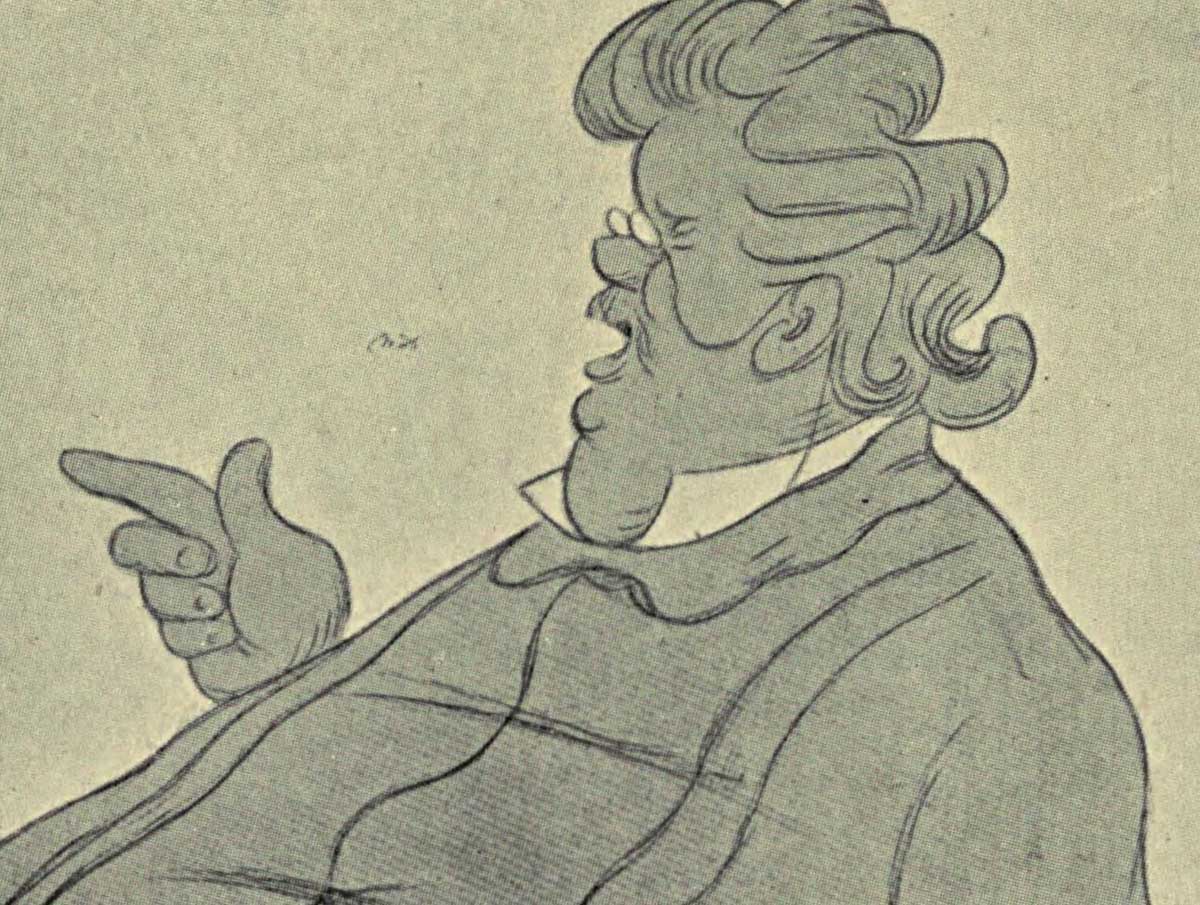Secular Saviors
Earthly Powers: The Clash of Religion and Politics in Europe from the French
Revolution to the Great War
by Michael Burleigh
HarperCollins, 2005
(530 pages, $29.95, hardcover)
reviewed by Peter J. Leithart
For millennia, human beings confused religion with politics, and some benighted souls still do. We moderns know better. It’s ironic that it took an unbelieving age to figure out what religion is, but, as the bumper sticker doesn’t say, ironies happen.
We know now that religion is spiritual. We’ve got it figured out. We’ve bottled up the spirit and found a safe place for it on the shelf.
Never Modern
Only we haven’t. Religion still interferes with politics. And it isn’t just maladjusted Evangelicals and militant Islamists who revert to the premodern mixture of politics and religion. On this point as on many others, French anthropologist Bruno Latour nailed it in the title of his 1993 book, We Have Never Been Modern.
As English historian Michael Burleigh shows in Earthly Powers, the first of a two-volume history of religion and politics in the modern world, the real conflict in modern Europe is not between religion and politics, or even between church and state. The conflict is between Christianity and various kinds of political religion.
Burleigh relies on Tocqueville’s analysis of the French Revolution to set the terms of his discussion. The revolutionaries of 1789 were, Tocqueville claimed, “striving for the regeneration of the human race,” and as a result, the Revolution “took on that appearance of a religious revolution.” It was, he admitted, “a new kind of religion, an incomplete religion . . . without God, without ritual, and without life after death.” Tocqueville compared it to Islam, a religion that “flooded the earth with its soldiers, apostles, and martyrs.”
The religion of the French Revolution brooked no rivals. Catholicism was the chief rival in France, and the revolution drove 25,000–30,000 priests into exile. When the revolutionaries found they couldn’t remove the past from the people, they decided they had to remove the people themselves. The result: thousands massacred, women hanged on trees and cut in half, many subjected to patriotic “baptisms”—by being drowned in the Loire.
France set the precedent for later revolutionary movements. Only sacrifice on a massive scale could regenerate man.
Political religion made another appearance in the nationalist movements of the nineteenth century, in which the nation-state dressed itself in vestments borrowed from Christianity. The state replaced the church; sacrifice for the Fatherland replaced martyrdom; God’s election of Israel was translated into his election of Germany, or France, or whatever. In Spain, a nationalist catechism inculcated virulent hatred for France into schoolchildren.
As Burleigh ends his tale, in the early twentieth century, political religion is still strong in Europe. Preachers promote World War I as a “holy war” and a “crusade”; fallen soldiers are Christ-figures; the rushing wind of war brings all Germans together in sweet Pentecostal unity. And he hasn’t even gotten to the movements for which the phrase “political religion” was coined: Leninism, Stalinism, Nazism, Fascism.
Christianity Estranged
Burleigh is very good in penetrating past the simplistic left-right arrangement that often plagues discussions of politics and religion, in which Christianity is associated with the forces of reaction and secularism with the forces of liberation, making religion the enemy of democracy. While it is true that conservatives often supported Christianity’s traditional role in European politics, liberals were also motivated by religion, usually anti-Catholicism and anticlericalism.
Burleigh highlights Christianity’s estrangement from itself: “The retreat from Christianity into irreligion . . . was paralleled by a much larger retreat from Christianity into religion.” Instead of confessing the particular truths of the Christian gospel, theologians and clergy defended the political usefulness of religion-in-general.
Many didn’t care which religion, and political religions would serve political uses as well as any. Nationalist idolatries could not have survived without the enthusiastic support of many clergy, all too ready to preach hatred for fellow Christians of neighboring countries. Anticlericalism would have had far less resonance if the Church had not often succumbed to the temptation to bathe in the glow of power.
There are triumphs, too. That the Catholic Church cautiously came round to endorsing democratic policies is one of the crucial developments of the nineteenth century. Pope Leo XIII is one of the heroes of this history. And no Christian can read the chapter on the English response to the “social question” of industrialization and urbanization without being justly proud of the energy and creative compassion Victorian Christians displayed in relieving poverty through both legislation and urban missionary work.
Grand History
Burleigh’s is history on a grand scale, but, believing that people make history, he gives intimate portraits of a number of eccentric individuals: “paleocons” like de Maistre and Bonald, progressive Catholics like Lammenais, pious secularists like Comte and Saint-Simon. He covers not only France, Germany, Italy, and Britain, but also the Russian cult of explosives, Polish and Irish nationalist movements, and the Greek war for independence.
Earthly Powers also draws on a wide variety of sources. Unusual in a work of political history, Burleigh includes lengthy analyses of novels like Mary Ward’s Robert Elsmore, Nicolai Chernyshevsky’s What Is to Be Done?, Dostoevsky’s The Possessed, and the poems of Polish nationalist Adam Mickiewicz.
This richly detailed and frequently witty study gives the lie to the modern myth that we have freed politics from religion, and leaves me eager to hear the rest of the story Burleigh tells so well.
Peter J. Leithart is an ordained minister in the Presbyterian Church in America and the president of Trinity House Institute for Biblical, Liturgical & Cultural Studies in Birmingham, Alabama. His many books include Defending Constantine (InterVarsity), Between Babel and Beast (Cascade), and, most recently, Gratitude: An Intellectual History (Baylor University Press). His weblog can be found at www.leithart.com. He is a contributing editor of Touchstone.
subscription options
Order
Print/Online Subscription

Get six issues (one year) of Touchstone PLUS full online access including pdf downloads for only $39.95. That's only $3.34 per month!
Order
Online Only
Subscription

Get a one-year full-access subscription to the Touchstone online archives for only $19.95. That's only $1.66 per month!
bulk subscriptions
Order Touchstone subscriptions in bulk and save $10 per sub! Each subscription includes 6 issues of Touchstone plus full online access to touchstonemag.com—including archives, videos, and pdf downloads of recent issues for only $29.95 each! Great for churches or study groups.
Transactions will be processed on a secure server.
more from the online archives
calling all readers
Please Donate
"There are magazines worth reading but few worth saving . . . Touchstone is just such a magazine."
—Alice von Hildebrand
"Here we do not concede one square millimeter of territory to falsehood, folly, contemporary sentimentality, or fashion. We speak the truth, and let God be our judge. . . . Touchstone is the one committedly Christian conservative journal."
—Anthony Esolen, Touchstone senior editor









